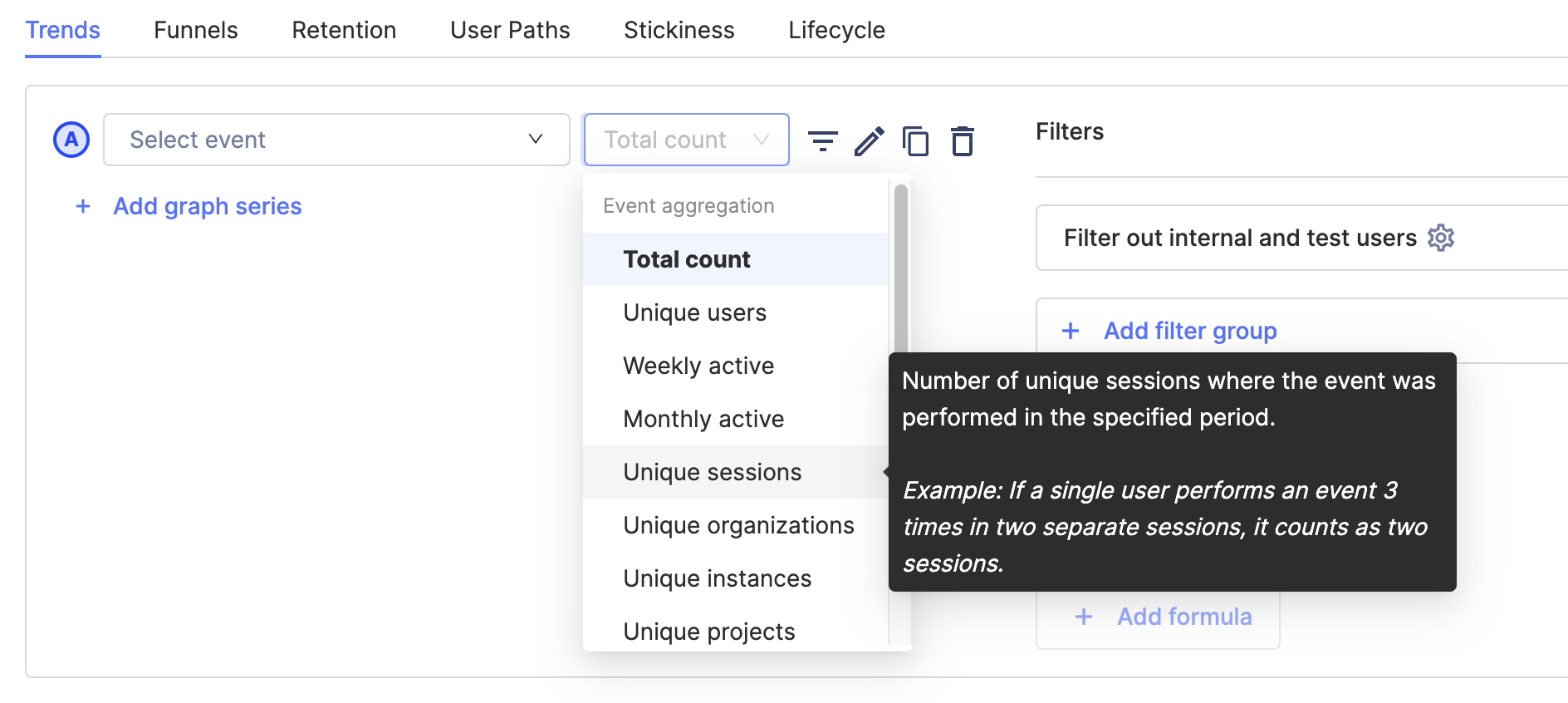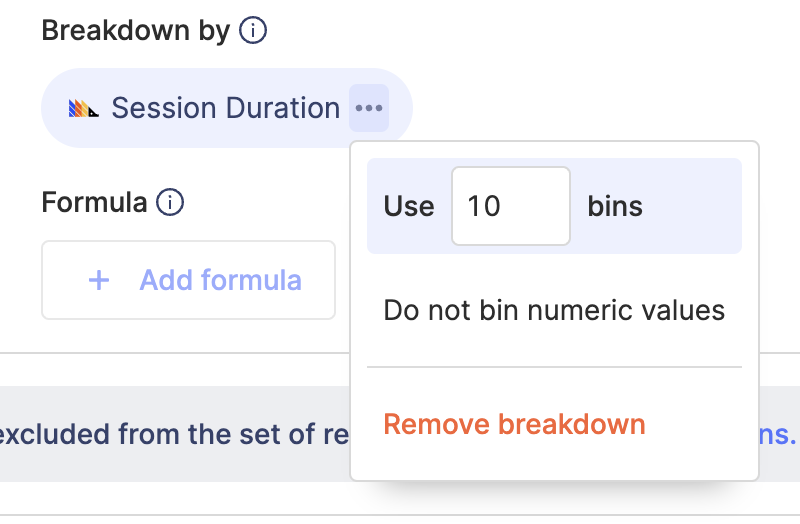Want to know more about what we're up to? Subscribe to HogMail, our newsletter, which we send out every two weeks!
Running a self-hosted instance? Check out our Upgrading PostHog guide.
Release highlights:
- New: Subscriptions & exports for dashboards and insights
- New: Session analysis returns
- New: Async migration 0005
- New: Feature flag persistence across authentication steps
- New: Breakdown bins
- Improved: Universal search
- Improved: Funnel breakdown attribution
- Improved: Library support for multivariate feature flags and experiments
- New: Four new apps released
We've added multiple ways to get insights and dashboards out of PostHog and into your other daily tools, such as Slack. You can now:
- Export dashboards or insights as an image, to share anywhere you need
- Setup email subscriptions to have updates sent to you and your team regularly
- Setup Slack subscriptions to get scheduled updates into any channel you choose
We've already found subscriptions to be incredibly useful for our team, so go ahead and get started!

After previously deprecating the Sessions page, we've now bought sessions back in a new and improved form. As of 1.38.0, we've added support for tracking and analyzing sessions within the insights feature.
This will enable you to get answers to questions such as:
- What's the average number of sessions/user/day?
- How many users visit a page and have a session length greater than 30 seconds?
- What's the distribution of session lengths for users who perform an event?
- How many unique sessions happen per day where a specific event is performed?
To learn more about session analysis, check out the sessions documentation.
Note: Sessions are currently only supported in posthog-js.
There is a new async migration available which changes the persons table in ClickHouse to use version instead of _timestamp for collapsing entries. This helps avoid various data integrity issues due to race conditions and batching of Kafka messages within the plugin-server.
Curious about async migrations? Find out more in the self-host docs, or examine this new migration specficially on GitHub.
Want to ensure users get a consistent experience across login steps? 1.38.0 improves feature flag persistence for such cases, which is great for experiments where you want the same user to be shown the same variant, no matter how their userID changes. Find out more in the feature flag persistence docs.
Note: This is currently only supported in posthog-js.

Now, when using the trends breakdown feature, if the property that you're breaking down by is a numerical value, it will be binned into a group.
For example, if you breakdown by a price property, instead of seeing the counts of discrete values like 10.99, 11.00, 12.50, you'll now see the counts of binned values, such as 10.00-13.00,13.01-15.00.
Prefer it the old way? Using the menu on the breakdown table, you can adjust the number of bins used or simply revert to using the discrete values.

Universal search got a massive upgrade in this update and now enables you to search for specific users with ease. This is especially useful if you want to find specific organizations or users quickly, such as if you're looking for more context on a bug report.
Universal search wasn't the only search-based update this time, either. We also made searching on the Persons page much faster and more reliable than it was before.
You can now choose which specific funnel step a breakdown property should come from, and whether the same value should be copied over to other funnel steps for analysis. This is very handy for getting even more value from funnels, and further information is included in the funnel documentation.
Our Node, Ruby, Go, and PHP libraries have been updated to support experiments! We are also trialling support for feature flags, groups, and session analytics in our mobile libraries. Interested in giving it a go? Let us know in the Slack community!
The community has been busy building many new apps for the PostHog App Store and we're excited to announce the following apps have been released for users on PostHog Cloud...
- Unduplicator, for cleaning duplicate events during data imports
- URL Normalizer, for introducing consistent casing across PostHog
- Engage Connector, for sending data to Engage for marketing automation
- Variance Connector, for sending data to Variance so you can define PQLs
Interested in building your own app? Here's how to get started!
The properties column takes up most of the space in any PostHog ClickHouse setup. This release changes out the default compression scheme for ZSTD(3), reducing space by around 2.4x and speeding up uncached queries by up to 2.4x.
After running this migration only new data will use the updated compression scheme. To get the full benefit of compression on existing data, run OPTIMIZE TABLE sharded_events FINAL on your clickhouse cluster which will rewrite existing data.
Version 1.38 also adds hundreds of other improvements and fixes, including...
- Fixed: Update to posthog-js and Hubspot app making sure we don't override
initial_referrerandinitial_referring_domain. If you ever saw these change and not reflect the true initial values update your posthog-js version (& Hubspot app on self-hosted) to make sure we don't override them in the future. - Improvement: Toolbar won't show up automatically anymore, but you can still launch it from the app. This made calls to feature flags faster too :)
- Improvement: We now automatically comment all SQL queries generated by PostHog with tags. This helps track down performance issues on self-hosted instances.
- Breaking change:
onActionplugin server function is removed. Improving the efficiency of the plugin-server. - Improvement: CSV and Image exports now use Object Storage when it is enabled
View the commit log in GitHub for a full history of changes: release-1.37.0...release-1.38.0.
We'd love to hear anything you have to say about PostHog, good or bad. As a thank you, we'll share some awesome PostHog merch.
Want to get involved? Email us to schedule a 30 minute call with one of our teams to help us make PostHog even better!
We always welcome contributions from our community and this time we want to thank the following people...
- @Sepal, for adding UTM segmentation docs
- @Zeviset, for correcting some GitLab Auth secrets
- @Klink, for correcting some typos on the site
- @Rahul3v, for correcting yet more typos on the site
- @Gitstart, for changing how apps are tagged
- @rafalmierzwiak, for adding some missing packages
- @hakubo, for fixing the seemingly endless typos on the site
Do you want to get involved in making PostHog better? Check out our contributing resources to get started, or head to our Slack group. We also have a list of Good First Issues for ideas on where you can contribute!
Want to join us in helping make more products successful? We're currently hiring for remote candidates in any of the following roles:
- Senior Product Manager
- Site Reliability Engineer - Kubernetes
- Senior Data Engineer
- Developer Advocate
- Full Stack Engineer - App
- Senior Backend Engineer
- Technical Content Marketer
Curious about what it's like to work at PostHog? Check out our careers page for more info about our all-remote team and transparent culture. Don’t see a specific role listed? That doesn't mean we won't have a spot for you. Send us a speculative application!
Follow us on Twitter or LinkedIn for more PostHog goodness!
Ready to find out more?
